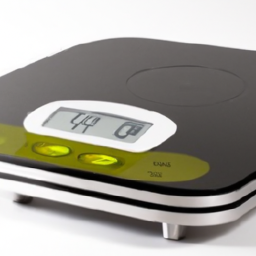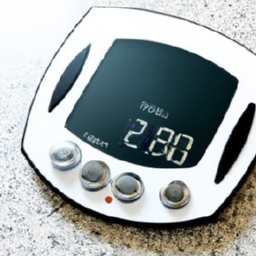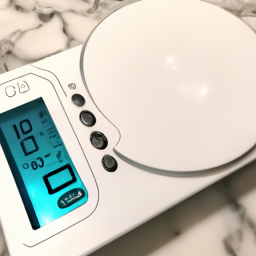What Features Should I Look For In A Smart Kitchen Scale
In the world of modern cooking, a smart kitchen scale has become an essential tool for every home chef. But with so many options available, it can be overwhelming to figure out which features are truly worth considering. Whether you’re a seasoned cook or just beginning your culinary journey, this article will guide you through the key features to look for when choosing a smart kitchen scale. From accurate measurements to seamless connectivity with your smartphone, you’ll find the perfect scale to elevate your cooking experience. So, let’s dive in and discover what makes a smart kitchen scale truly smart!
Functionality of the Scale
A smart kitchen scale offers a range of functionalities that greatly enhance your cooking and baking experience. First and foremost, it provides accurate and precise measurements of ingredients, allowing you to follow recipes with ease and achieve consistent results. Whether you need to measure in grams, ounces, pounds, or milliliters, a smart scale offers various measuring units to suit your needs.
Another key aspect of functionality is the weight capacity of the scale. Look for a scale that can handle a wide range of weights, from small amounts for precise measurements to larger quantities for bulk cooking or baking. This versatility ensures that you can use the scale for a variety of recipes, whether you’re making a delicate sauce or preparing a feast for a large gathering.
In addition to the weight capacity, the increment of measure is an important consideration. Opt for a scale that allows for precise measurements with small increments. This ensures that you can accurately measure even the smallest amounts of ingredients, such as spices or flavorings, without any guesswork.
One handy feature that many smart scales offer is the tare function. This allows you to place a container on the scale, reset the weight to zero, and then measure the ingredients added to the container. This eliminates the need for multiple bowls or measuring cups and makes for a more streamlined and efficient cooking process.
App Connectivity
The ability to connect the smart kitchen scale to your devices opens up a whole new world of possibilities. Look for a scale that is compatible with your smartphone or tablet, so you can easily access and utilize its features through a dedicated app. This connectivity allows for seamless integration with your digital lifestyle and brings a host of benefits.
One of the key advantages of app connectivity is access to an online database of food information. This database provides detailed nutritional information for a wide range of food items, allowing you to make informed choices about your diet and track your calorie intake. With this wealth of information at your fingertips, you can easily manage your dietary goals and make healthier choices.
Furthermore, a smart scale with app connectivity can offer personalized recipe recommendations based on the ingredients you weigh. By inputting what you have available in your kitchen, the app can suggest recipes that utilize those ingredients, reducing waste and inspiring your culinary creativity. This feature not only saves you time and effort in meal planning but also helps you discover new and exciting dishes.
Tracking and analyzing your dietary intake becomes effortless with a smart scale and its app connectivity. You can easily create a food diary, inputting everything you eat and drink throughout the day, and the scale will automatically calculate the nutritional information and give you a comprehensive overview of your dietary intake. This information can be invaluable in achieving your health and wellness goals.
Design and Build Quality
When it comes to design and build quality, a smart kitchen scale should be both practical and aesthetically pleasing. Pay attention to the materials used in its construction, as they will determine the durability and longevity of the scale. Look for scales made from high-quality materials such as stainless steel or tempered glass, which not only provide strength and sturdiness but also make the scale easy to clean.
Consider the size and portability of the scale. Ideally, it should be compact enough to fit comfortably in your kitchen but still offer a moderately sized weighing platform for measuring a range of ingredients. Portability is particularly important if you plan to use the scale in various locations or take it with you when cooking or baking away from home.
Ease of cleaning is another crucial factor to consider. Look for a scale with a smooth surface and minimal crevices to prevent food debris from getting trapped. Some scales even offer detachable weighing platforms or splashproof designs, making cleaning a breeze. A scale that is easy to clean not only saves you time and effort but also ensures food safety and hygiene.
Integrated Nutritional Data
One of the standout features of a smart kitchen scale is its integrated nutritional data. By having a vast database of food items, it can provide accurate and detailed information on calories, macronutrients (such as protein, carbohydrates, and fat), as well as micronutrients (such as vitamins and minerals). This feature is particularly helpful if you’re conscious about your dietary intake and want to maintain a healthy and balanced diet.
The ability to customize food data is also worth considering. Some scales allow you to add your own food items or adjust the nutritional information for existing entries. This flexibility enables you to tailor the scale to your specific needs, whether you have unique dietary requirements or prefer to use local or homemade ingredients.
With a smart scale that offers a built-in food diary and tracking functionality, you can effortlessly keep a record of your meals and snacks. This allows you to monitor your eating habits and make informed decisions about portion sizes and food choices. The comprehensive overview of your dietary intake helps you stay on track with your nutrition goals and can be a valuable tool in maintaining a healthy lifestyle.
Ease of Use and Operation
A user-friendly experience is essential when it comes to a smart kitchen scale. The user interface should be intuitive and easy to navigate, allowing you to access the various functions and features without any confusion. Look for a scale that has a clear and responsive display, capable of showing the weight measurements and other information legibly.
An instructional manual and guide can be immensely helpful, especially if you are new to using a smart scale. Make sure that the scale comes with clear instructions on how to set it up, calibrate it (if necessary), and utilize its key features. A step-by-step guide can save you time and frustration, ensuring that you can start using the scale to its full potential right away.
Battery Life and Power Options
The type of battery used in a smart kitchen scale can greatly impact its convenience and usability. Look for a scale that uses a commonly available battery type, such as AAA or CR2032, so you can easily find replacements when needed. Consider the expected battery life of the scale and opt for one that offers a decent lifespan between battery changes.
It is also important to choose a scale that provides a clear indication of low battery. This ensures that you are never caught off guard with a dead battery in the middle of cooking or baking. Look for a scale that displays a low battery warning, either through an icon or a message on the screen, giving you ample time to replace the battery.
An auto-off feature is another valuable addition to a smart scale. This feature automatically turns off the scale after a period of inactivity, helping to conserve battery power. This is particularly useful if you often forget to manually turn off the scale after use or if you frequently leave it unattended during the cooking process.
Consider whether the scale offers alternative power options as well, such as the ability to use it with an AC adapter or rechargeable batteries. These options can provide additional convenience, especially if you regularly use the scale for extended periods or prefer not to rely solely on disposable batteries.
Precision and Accuracy
When it comes to measuring ingredients, precision and accuracy are of utmost importance. A smart kitchen scale should provide reliable and consistent measurements, ensuring that you can achieve the best results in your culinary endeavors. Look for a scale that has a low margin of error, ensuring that you can confidently rely on its measurements.
The reliability of measurements can be impacted by factors such as the scale’s calibration features. A scale that allows for calibration enables you to adjust its measurement accuracy and compensate for any slight variations. This ensures that the scale remains accurate over time and after prolonged use.
Verification and testing are critical aspects to consider when assessing the precision and accuracy of a smart scale. Look for scales that have been tested and verified by trustworthy organizations or regulatory bodies. Additionally, read customer reviews and expert opinions to get a sense of how well the scale performs and whether it consistently delivers accurate measurements.
Price and Value
When evaluating a smart kitchen scale, it’s essential to consider the balance between price and value. Comparing the cost of the scale with its features and functionalities is an important step in making an informed purchasing decision. Evaluate whether the scale offers a range of useful features that align with your needs, ensuring that the price reflects the overall value you will receive.
Warranty and customer support are additional factors to consider. Look for scales that come with a warranty, as this provides reassurance that the manufacturer stands behind their product’s quality and performance. Additionally, consider the level of customer support offered, such as readily available assistance or online resources, for any troubleshooting or inquiries you may have.
To further gauge the scale’s value, take into account market comparisons and reviews. Look for reputable sources that have reviewed and compared different smart scales, assessing their performance, features, and overall value for money. This will help you make a well-informed decision and ensure that you choose a scale that meets your expectations and budget.
Additional Features
Aside from the core functionalities, a smart kitchen scale may offer additional features that enhance its versatility and usefulness. Consider whether the scale is compatible with any accessories that can extend its capabilities, such as bowls or containers specifically designed for use with the scale. Having these accessories readily available can make your cooking and baking experience even more convenient.
Advanced technologies, such as Bluetooth or Wi-Fi connectivity, may also be present in some smart scales. These technologies enable seamless integration with other smart devices or platforms, allowing for enhanced data sharing or automated functions. Consider whether these advanced features align with your preferences and whether they add value to your cooking or baking routine.
Multipurpose use is another aspect to consider. Some smart scales offer additional modes or settings that allow you to use them for more than just weighing ingredients. For example, a scale may have a mode for measuring liquids, or it may have a built-in timer for precise timing during cooking or baking. Assessing these additional features can help you find a scale that best suits your needs and preferences.
Lastly, check the availability of software updates for the smart scale. Software updates ensure that the scale remains up to date with the latest features, bug fixes, and improvements. A scale that offers regular software updates indicates that the manufacturer is committed to enhancing and maintaining the scale’s performance over time.
Customer Reviews and Reputation
Customer reviews provide valuable insights into the real-life experiences of people who have used the smart kitchen scale. Look for both positive and negative reviews to get a balanced perspective. Positive reviews can indicate that the scale performs well and meets user expectations, while negative reviews can highlight any potential weaknesses or issues you should be aware of.
When assessing customer reviews, pay attention to common themes or recurring comments. This can help you identify any consistent advantages or disadvantages of the scale, providing a better understanding of its overall performance and user satisfaction.
Company reputation is another important consideration. Research the manufacturer’s reputation in the industry to assess their track record and commitment to quality. A company with a strong reputation is more likely to produce reliable and high-quality products, ensuring that your investment in a smart scale is worthwhile.
Awards and accreditations earned by the manufacturer or the specific smart scale can also provide a measure of its credibility and performance. Look for any industry awards or certifications that speak to the scale’s quality and adherence to standards. These accolades can provide additional reassurance of the scale’s reliability and performance.
Furthermore, opinions from industry experts, such as chefs, nutritionists, or culinary writers, can offer valuable insights into the quality and usefulness of the smart scale. Their expertise and experience can shed light on the advantages and disadvantages of the scale from a professional standpoint, giving you a well-rounded perspective on its capabilities.
In conclusion, a smart kitchen scale offers a range of functionalities that greatly enhance your cooking and baking experience. Consider the measuring units, weight capacity, increment of measure, and tare function to ensure accurate and precise measurements. App connectivity allows for compatibility with devices, access to an online database for food information, personalized recipe recommendations, and tracking and analyzing dietary intake. Design and build quality should encompass the materials used, size and portability, durability and longevity, and ease of cleaning. Integrated nutritional data should provide a database of food items, calorie and nutrient information, the ability to customize food data, and a food diary for tracking. Ease of use and operation should include a user-friendly interface, display readability, ease of navigation, and an instructional manual and guide. Battery life and power options are important factors, including the type of battery used, indication of low battery, auto-off feature, and alternative power options. Precision and accuracy are paramount, considering the room for error, reliability of measurements, calibration features, and verification and testing. Price and value can be assessed by comparing costs with features, considering warranty and customer support, evaluating market comparisons and reviews, and analyzing cost versus long-term value. Additional features such as compatible accessories, advanced technologies, multipurpose use, and availability of software updates can further enhance the scale’s usefulness. Customer reviews and reputation provide insights into positive and negative experiences, assessing company reputation, looking at awards and accreditations, and considering opinions from industry experts. By considering these factors, you can make an informed decision and choose a smart kitchen scale that best meets your needs and enhances your cooking and baking endeavors.







